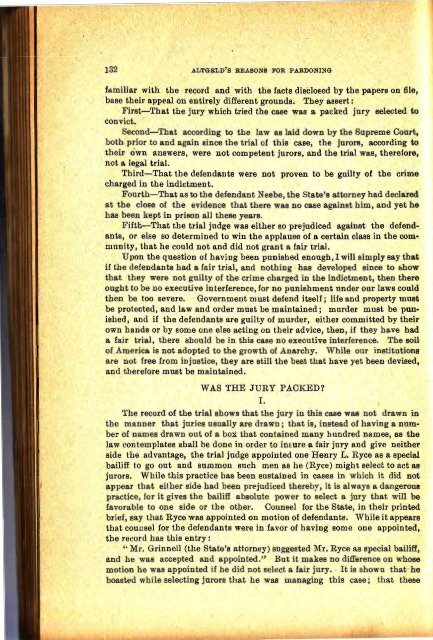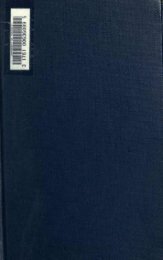The Chicago Martyrs by John P. Altgeld
The Chicago Martyrs by John P. Altgeld
The Chicago Martyrs by John P. Altgeld
You also want an ePaper? Increase the reach of your titles
YUMPU automatically turns print PDFs into web optimized ePapers that Google loves.
132<br />
ALTGELD'S REASONS FOR PARDONING<br />
FIELDEN, NEEBE AND SCHWAB.<br />
133<br />
familiar.with the record and with the facts disclosed <strong>by</strong> the papers on file,<br />
base thell' appeal on entirely different grounds. <strong>The</strong>y assert:<br />
~irst~Thatthe jury which tried the case was a packed jury selected to<br />
convICt.<br />
Second-That according to the law as laid down <strong>by</strong> the Supreme Coort,<br />
bot?, p~ior to and again since the trial of this case, the jurors, according to<br />
theIr own answers, were not competent jurors, and the trial was, therefore,<br />
not a legal trial.<br />
Third-That the defendants were not proven to be guilty of the crime<br />
charged in the indictment. ,<br />
Fourth-That as to the defendant Neebe, the State's attorney had declared<br />
at the close of the evidence that there was no case against him, and yet he<br />
has been kept in prison all these years. ,<br />
Fifth-That the trial judge was either so prejudiced against the defendants,<br />
or else so determined to win the applause of a certain class in the community,<br />
that he could not and did not grant a fair trial.<br />
. Upon the question of having been punished enough, I will simply say that<br />
If the defendants had a fair tri~l, and nothing has developed since to r,how<br />
that they were not guilty of the crime charged in the indictment, then there<br />
ought to be no executive interference, for no punishment under our law's could<br />
then be too severe. Government must defend itself; life and property must<br />
?e protecte~,and law and order must be maintained; murder must be pun<br />
Ished, and If the defendants are guilty of murder, either committed <strong>by</strong> their<br />
own.han~s or <strong>by</strong> some one else acting on their advice, then, if they have had<br />
a fair trIal, there should be in this case no executive interference. <strong>The</strong> soil<br />
of America is not adopted to the growth of Anarchy. While our institutions<br />
are not free from injustice, they are still the best that have yet been devised,<br />
and therefore must be maintained.<br />
WAS THE JURY PACKED?<br />
1. I<br />
<strong>The</strong> record of the trial shows that the jury in this case was not drawn in<br />
the manner that juries usually are drawn; that is, instead of having a number<br />
of names drawn out of a bex that contained many hundred names, as the<br />
law contemplates shall be done in order to imure a fair jury and give neither<br />
side the advantage, the trial judge appointed one Henry L. Ryce as a special<br />
bailiff to go out and summon such men as he (Ryce) might select to act as<br />
jurors. While this practice has been sustained in cases in which it did not<br />
appear that either side had been prejudiced there<strong>by</strong>, it is always a dangeroull<br />
practice, for it gives the bailiff absolute power to select a jury that will be<br />
favorable to one side or the oth.er. Counsel for the State, in their printed'<br />
brief, 'say that Ryce was appointed on motion of defendants. While it appears<br />
that couDsel ,for the defendants were in favor of having some one appointed,<br />
the record has this entry:<br />
"Mr. Grinnell (the State's attorney) suggested Mr. Ryce as spe~ial bailiff,<br />
and he waB accepted and appointed." But it makes no difference on whose<br />
motion he was appointed if he did not select a fair jury.. It is shown that he<br />
boasted while selecting jurors that he was managing this case; that these<br />
fellows would hang as certain as death; that he was calling such men as the<br />
defendants would have to challenge peremptorily and waste their challenges<br />
on and' that when their challenges were exhausted they would have to take<br />
, , f h t' 1<br />
Buch men as the prosecution wanted. It appears from the record 0 t e ria<br />
that the defendants were obliged to exhaust all of their peremptorychallenges,<br />
and they had to take a jury, almost every member of which stated frankly<br />
that he was prejudiced against them. On page 133, of volume I, of the record,<br />
_it appears that when the panel was about two-thirds full, counsel fo~ defendants<br />
called attention of the court to the fact that RYxe was summonmg only \<br />
prejudiced men, as shown <strong>by</strong> their examinations. Further: That he was<br />
'confining himself to particular classes, i. e., clerks, merch~nts,~anufactu~ers,<br />
etc. Counsel for defendants then moved the court to stop thIS .and direct<br />
Ryce' to summon the jurors from the body of the people; that IS, from the<br />
community at large, and not from particular classes; but the court refused to<br />
take any notice ofthematter.' , ..<br />
, For the purpose of still further showing the misconduct of BailIff Ryce,<br />
reference is made to the affidavit of Otis S. Favor. Mr. Favor is one of the<br />
most reputable and honorable business men in <strong>Chicago</strong>; he, was himself summoned<br />
<strong>by</strong> Ryce as a juror, but was so prejudiced. against the de.fenpants that<br />
he had to be excused and he abstain'ed from makmg any affidavlt before sentence<br />
because the St~te's attorney had requested him not to make it, although<br />
be stoed ready to go into court and tell what he knew if the court wished him<br />
to do so and he naturally supposed he would be sent for. But after the Supreme.C~nrthad<br />
passed on the case, and some of the defendants were about<br />
to be hanged, he felt that an injustice was being done, and he made the following<br />
affidavit:<br />
STATE OF ILLINOIS, } ss<br />
Cook County. . . . .<br />
Otis S. Favor, being duly sworn, on oath'says that he 18 a cItIzen of the<br />
United States and of the State of Illinois, residing in <strong>Chicago</strong>, and a merchant<br />
doing bUfliness at Nos. 6 and 8 Wabash avenue, in the city of <strong>Chicago</strong>, in said<br />
county. That he is very well acquainted with He~ry~. Ryc?,of Cook county,<br />
Illinoi,B, who acted as special bailiff in summonmg luro:s I~ the case ?f !he<br />
People, etc. vs. Spies et aI., indictment for murder, trIed In th~ Cnmmal<br />
Court of Cook county, in the summer of 1886. That affiant was hImself summoned<br />
<strong>by</strong> said Ryce for a juror in said cause, but was chal~eng~dand excu~ed<br />
therein because of his prejudice. That on several. OCCaSIOns I~ conversatl~n<br />
between affiant and said Ryce touching the summomng of the Jurors <strong>by</strong> sa~d<br />
Ryce and while said Ryce was 80 acting as special bailiff as aforesaid, said<br />
Ryce'said to this affiant and to other persons in affiant's presence, in s~bstance<br />
and llffect as follows, to-wit: "I (meaning said Ryce) am managmg<br />
this case (meaning this case against Spies et al.) and know what I am about.<br />
Those fellows (meaning the defendants, Spies et a1.) are going to be hanged as ,"<br />
certain as death. I am calling such men as the defendants will have ~o challenge<br />
peremptorily anet waste their time and challenges. <strong>The</strong>n they WIll have<br />
to take such men as the prosecution wants." That affiant has been very<br />
r 111 ·tant to make any affidavit in this case, having no sympathy with Anarchy<br />
lior r lationship to or personal interest in the defendants or any of them, and
















